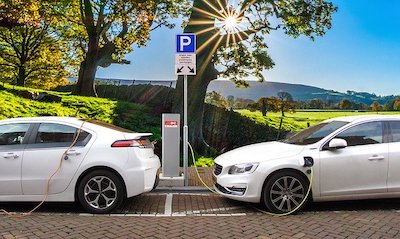Electric Cars Better for Climate in 95% of the World Claims New Report
Fears that electric cars could actually increase carbon emissions are unfounded in almost all parts of the world, new research reportedly shows.
April 1, 2020

Media reports have regularly questioned whether electric cars are really “greener” once emissions from production and generating their electricity are taken into account. Indeed academics in Germany recently reported that considering Germany’s current energy mix and the amount of energy used in battery production, the CO2 emissions of battery-electric vehicles are, in the best case, slightly higher than those of a diesel engine.
But a new study by the universities of Exeter (UK), Nijmegen (the Netherlands) and Cambridge (UK) has concluded that electric cars lead to lower carbon emissions overall, even if electricity generation still involves substantial amounts of fossil fuel. Already under current conditions, driving an electric car is better for the climate than conventional petrol cars in 95% of the world, the study finds. The only exceptions are places like Poland, where electricity generation is still mostly based on coal.
|
Already under current conditions, driving an electric car is better for the climate than conventional petrol cars in 95% of the world. Image by (Joenomias) Menno de Jong from Pixabay. |
Average lifetime emissions from electric cars are up to 70% lower than petrol cars in countries like Sweden and France (which get most of their electricity from renewables and nuclear), and around 30% lower in the UK. In a few years, even inefficient electric cars will be less emission-intensive than most new petrol cars in most countries, as electricity generation is expected to be less carbon-intensive than today.
The study projects that in 2050, every second car on the streets could be electric. This would reduce global CO2 emissions by up to 1.5 gigatons per year, which is equivalent to the total current CO2 emissions of Russia.
The study also looked at electric household heat pumps, and found they too produce lower emissions than fossil-fuel alternatives in 95% of the world. Heat pumps could reduce global CO2 emissions in 2050 by up to 0.8 gigatons per year – roughly equal to Germany’s current annual emissions.
“We started this work a few years ago, and policy-makers in the UK and abroad have shown a lot of interest in the results,” said Dr Jean-Francois Mercure, of the Global Systems Institute at the University of Exeter. “The answer is clear: to reduce carbon emissions, we should choose electric cars and household heat pumps over fossil-fuel alternatives.”
“In other words, the idea that electric vehicles or electric heat pumps could increase emissions is essentially a myth,” said Dr Florian Knobloch, of the Environmental Science Department at the University of Nijmegen (The Netherlands), the lead author of the study. “We've seen a lot of discussion about this recently, with lots of disinformation going around. Here is a definitive study that can dispel those myths. We have run the numbers for all around the world, looking at a whole range of cars and heating systems. Even in our worst-case scenario, there would be a reduction in emissions in almost all cases. This insight should be very useful for policy-makers.”
The study examined the current and future emissions of different types of vehicles and home heating options worldwide. It divided the world into 59 regions to account for differences in power generation and technology.
In 53 of these regions – including the US, China and most of Europe – the findings show electric cars and heat pumps are already less emission-intensive than fossil-fuel alternatives. These 53 regions represent 95% of global transport and heating demand and, with energy production decarbonizing worldwide, Dr Mercure said the “last few debatable cases will soon disappear”.
The researchers carried out a life-cycle assessment in which they not only calculated greenhouse gas emissions generated when using cars and heating systems, but also in the production chain and waste processing.
“Taking into account emissions from manufacturing and ongoing energy use, it’s clear that we should encourage the switch to electric cars and household heat pumps without any regrets,” Dr Knobloch concluded.
The paper, published in the journal Nature Sustainability, is entitled: “Net emission reductions from electric cars and heat pumps in 59 world regions over time.”
The study does not address non-exhaust emissions from automobiles, such as brake dust and tire dust, which can be 1000-times worse and tend to be higher for heavier vehicles such as SUVs and electric cars, which tend to be heavier than their standard gasoline or diesel engine counterparts, according to a study by Emissions Analytics.
About the Author(s)
You May Also Like




